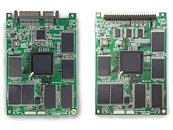- Joined
- Oct 9, 2007
- Messages
- 47,849 (7.39/day)
- Location
- Dublin, Ireland
| System Name | RBMK-1000 |
|---|---|
| Processor | AMD Ryzen 7 5700G |
| Motherboard | Gigabyte B550 AORUS Elite V2 |
| Cooling | DeepCool Gammax L240 V2 |
| Memory | 2x 16GB DDR4-3200 |
| Video Card(s) | Galax RTX 4070 Ti EX |
| Storage | Samsung 990 1TB |
| Display(s) | BenQ 1440p 60 Hz 27-inch |
| Case | Corsair Carbide 100R |
| Audio Device(s) | ASUS SupremeFX S1220A |
| Power Supply | Cooler Master MWE Gold 650W |
| Mouse | ASUS ROG Strix Impact |
| Keyboard | Gamdias Hermes E2 |
| Software | Windows 11 Pro |
Buffalo launched a new line of SSDs that incorporate MRAM (magnetic random access memory) caches. The caches provide increase tolerance to power loss, and momentarily hold data that's being transacted between the drive and the host, which buys the controller some time to prevent data loss, when the power goes down. Pictures suggest that Buffalo could have SSDs in both SATA and IDE flavors. So far, MRAM cache is the only distinctive feature of a new line of SSDs Buffalo is working on, which it will unveil a little later, at the Embedded Systems Expo (ESEC) 2012.

View at TechPowerUp Main Site

View at TechPowerUp Main Site





